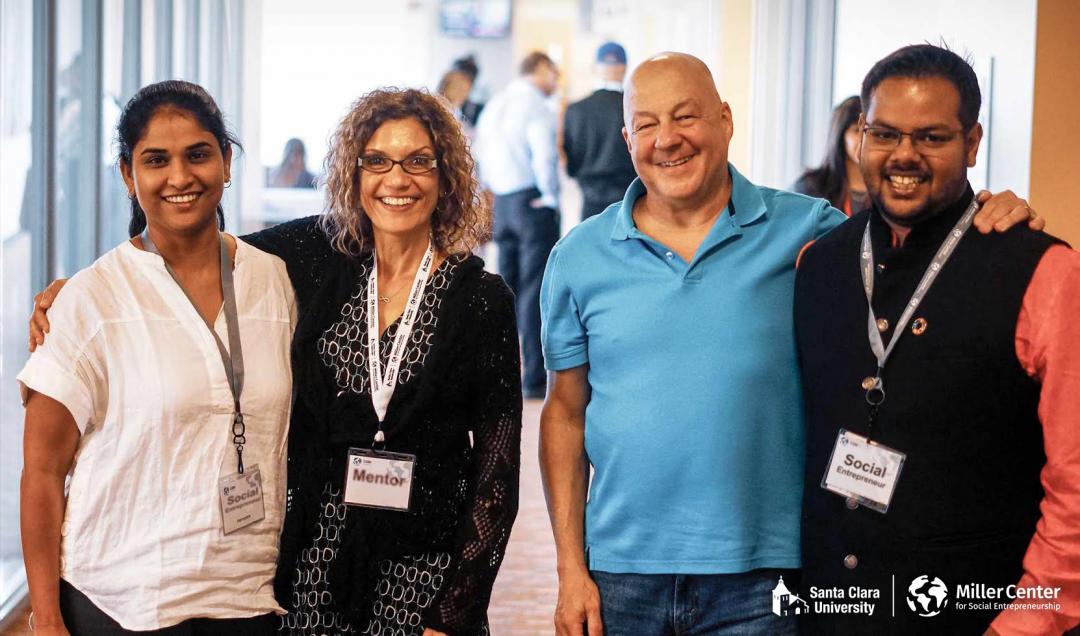Mentoring insights, Part 2
Pamela Roussos was introduced by a friend to the Global Social Benefit Institute (GSBI), which runs the Miller Center’s accelerator programmes. As someone who has had important mentors in her life, she was drawn to mentorship and has been a mentor with Miller Center for over 10 years. She is honored to support entrepreneurs just as she has been supported.
Can you tell us more about the GSBI mentoring programme?
Miller Center runs a programme that is focused on business models and has a structured curriculum. The magic unfolds when we pair the entrepreneurs up with one or two mentors. Our mentors are typically Silicon Valley executives, people who have experience building and running businesses. Mentor and entrepreneur meet on weekly calls, where the entrepreneurs will present the work that they've done and get feedback on that. There's a curriculum that guides the conversation, but the entrepreneurs also come to these calls with their issues of the day. Entrepreneurs are always running into something and over time the mentors become trusted advisors to these entrepreneurs. The conversation can kind of range and go in lots of different ways.
Even though our programmes have an end (some are six months, some nine months), oftentimes the mentors and the entrepreneurs will keep a relationship going because a deep connection has been established. Sometimes that's on a regular basis—they'll just set up monthly or quarterly calls. Sometimes the entrepreneurs will ask mentors to be on their boards.
What are three qualities that make a great mentor?
Listening is an especially important quality. In Silicon Valley we're surrounded by smart people, but many of them wouldn't make good mentors because they don't know how to listen. Sitting here, we don't know how to run a business in Northern Nigeria and Rajasthan and all these places.
Being humble is another one. Again, we need to be humble and know that the social entrepreneur really is the expert in the room. They have the answers, they just need help finding them. That's the role of the mentor: to guide and help them unearth the answers that the social entrepreneur might have already.
The third involves a dance, if you will… a mentor should be a cheerleader and a huge proponent of the entrepreneur, but then also sometimes needs to show tough love, pushing the entrepreneur in ways that don’t feel comfortable. There's a balancing act that a mentor has to play when working with an entrepreneur.
What are three qualities that make a great mentee?
The mentee must listen as well. When entrepreneurs think they know all the answers, a mentor wonders, "Well, why are we doing this?" It gets frustrating as a mentor if an entrepreneur isn't willing to consider that there might be some other ways of thinking about something. Diligence in getting the homework done and being respectful by showing up on time for calls are also important for both the mentor and the mentee.

I guess to overcome challenges like this you have to come up with innovative solutions. How can mentoring propel innovation in a company?
When people think about innovation, especially here in Silicon Valley, they think of technology innovation, like coming up with the next app. For many of the entrepreneurs we work with, the innovations are in business models, in how they get products to market because their market is in really hard to reach places with customers that are poor.
For example, innovation is in last mile distribution companies because the margins are so thin. They need to innovate in interesting ways, not necessarily around technology. Thinking creatively can mean training the sales agents in a way that is efficient and effective. They can't have long training because it costs too much and the sales agents need to start earning an income quickly. If they don't, then they'll go away. Those are ways of thinking about innovation in these low resource settings that are not just about technology.
Apart from mentorship, what are other methods for entrepreneurs to grow personally and grow their businesses?
Peer learning is valuable too. Most of our programmes are virtual, but we do have a couple of programmes where the entrepreneurs come together. There's so much learning that can happen between them. Even though they're not in the same market, if an organization is doing something with water and another organization is doing something with health care, they can still support each other and learn from each other. Entrepreneurship is lonely, and social entrepreneurship is lonelier.
As a mentor, do you find it useful to draw on your own experiences, and if so, how do you approach this?
I do, but I also recognise that there are many ways of doing things and I don't have all the answers. It's a part of being humble, right? I will draw from my experience, but then also be very open to understanding how an entrepreneur is already trying to solve a problem. If it's not working, then let's dig in and figure out why and how we can solve that. Maybe some of my experiences will be useful, but mentoring is about discovering together, not me telling the entrepreneur how to do things.
